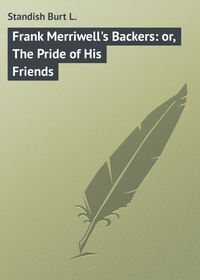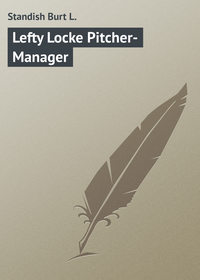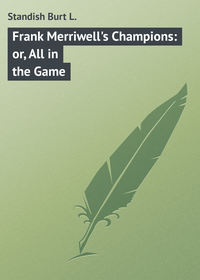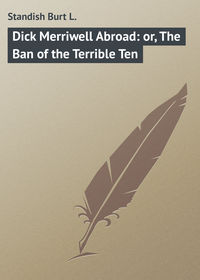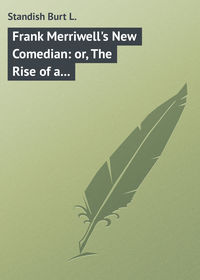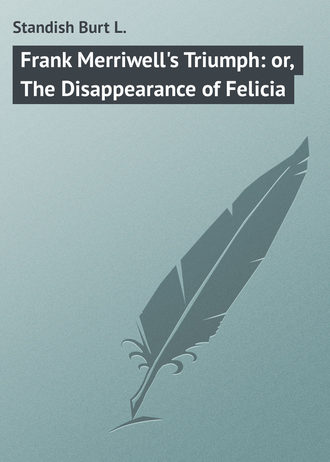 полная версия
полная версияFrank Merriwell's Triumph: or, The Disappearance of Felicia
“I don’t know that you understand all this, Abe, but many parents make sad mistakes in seeking to force too much education into the heads of their children in a brief space of time. It is not always the boy or girl who is the smartest as a boy or girl who makes the smartest and most successful man or woman. Some of the brightest and most brilliant scholars fail after leaving school. Although at school they were wonders in their classes, in after life others who were not so brilliant and promising often rise far above them.”
“I don’t know nothing about those things, Frank,” said the boy. “You seem to know all about everything. But I want you to tell me more about the school and the games they play and the things they do there.”
“Not to-night, Abe,” said Merry. “Go to sleep now. Sometime I will tell you all about it.”
Long after Merry’s regular breathing indicated that he was slumbering, little Abe lay trying to picture to himself that wonderful school, where so many boys studied, and lived, and prepared themselves for careers. It was a strange school his fancy pictured. At last he slept also, and he dreamed that he was in the school with other boys, that he was straight, and strong, and handsome, and that Dick Merriwell was his friend and companion. He dreamed that he took part in the sports and games, and was successful and admired like other lads. It was a joyful dream, and in his sleep he smiled and laughed a little. But for the poor little cripple it was a dream that could never come true.
In the night Frank was aroused by Bart, who lay down, while Merry took his place on guard outside the tent. The night was far spent when Frank awakened Wiley to take a turn at watching over the camp.
“Port your helm!” muttered the sailor thickly, as Merry shook him. “Breakers ahead! She’s going on the rocks!”
“Turn out here,” said Frank. “It’s your watch on deck!”
“What’s that?” mumbled the sailor. “Who says so? I am cap’n of this ship. I give off orders here.”
Merry seized him by the shoulders and sat him upright.
“In this instance,” declared Frank, “you’re simply the man before the mast. I am captain this voyage.”
“I deny the allegation and defy the alligator,” spluttered Wiley, waving his arms in the dark. “I never sailed before the mast.”
Frank was finally compelled to drag him bodily out of the tent, where at length Wiley became aware of his surroundings and stood yawning and rubbing his eyes.
“This is a new turn for me, mate,” he said. “It has been my custom in the past to lay in my royal bunk and listen to the slosh of bilge water and the plunging of my good ship through the billows, while others did the real work. I always put in my hardest work at resting. I can work harder at resting than any man I know of. I have a natural-born talent for it. Nevertheless, Cap’n Merriwell, I now assume my new duties. You may go below and turn in with the perfect assurance that little Walter will guard you faithfully from all harm. Though a thousand foes should menace you, I will be on hand to repel them.”
“That’s right, Wiley; keep your eyes open. There may be no danger, but you know what happened early this night.”
“Say no more,” assured Wiley. “I am the embodied spirit of active alertness. Permit rosy slumber to softly close your dewy eyes and dream sweet dreams of bliss. Talk about real poetry; there’s a sample of it for you.”
Smiling a little at the eccentricities of the sailor, Frank slipped into the tent and again rolled himself in his blanket.
Rosy dawn was smiling over the eastern peaks when Frank opened his eyes. The others were still fast asleep, and Merry wondered if Wiley had already started a fire preparatory for breakfast. It seemed singular that the sailor had not aroused them before this. Stealing softly from the tent, Merry looked around for the captain. At first he saw nothing of him, but after some minutes he discovered Wiley seated on the ground, with his back against a bowlder and with his head bowed. Approaching nearer, Frank saw the sailor was fast asleep, with a revolver clutched in his hand.
“Sleeping at your post, are you?” muttered Frank, annoyed. “Had there been enemies near, they might have crept on us while you were sleeping and murdered the whole party. You deserve to be taught a lesson.”
Making no noise, he drew nearer, keeping somewhat to one side and behind the sailor, then bent over and uttered a piercing yell in Wiley’s ear. The result was astonishing. With an answering yell, the sailor bounded into the air like a jack-in-the-box popping up. As he made that first wild, electrifying leap he began shooting. When his feet struck the ground he started to run, but continued shooting in all directions.
“Repel boarders!” he yelled. “Give it to them!”
Frank dropped down behind the bowlder to make sure that he was protected from the bullets so recklessly discharged from the cap’n’s revolver. Peering over it, he saw Wiley bound frantically down the slope toward the spring, catch his toe, spin over in the air, and plunge headlong. By a singular chance, he had tripped just before reaching the spring, and he dived into it, splashing the water in all directions. This termination of the affair was so surprising and ludicrous that Merry was convulsed with laughter. He ran quickly out, seized the sailor by the heels, and dragged him out. Wiley sat up, spluttering and gurgling and spouting water, very stupefied and very much bewildered.
This sudden commotion had brought Hodge leaping from the tent, a weapon in hand, while Abe and Worthington crawled forth in alarm.
Merry’s hearty laughter awoke the echoes of the valley.
“Why do you disturb the placid peacefulness of this pellucid morning with the ponderous pyrotechnics of your palpitating pleasure?” inquired Wiley. “Did it amuse you so much to see me take my regular morning plunge? Why, I always do that. I believe in a cold bath in the morning. It’s a great thing. It’s a regular thing for me. I do it once a year whether I need it or not. This was my morning for plunging, so I plunged. But what was that elongated, ear-splitting vibration that pierced the tympanum of my tingling ear? Somehow I fancy I heard a slight disturbance. I was dreaming just at that moment of my fearful encounter with Chinese pirates in the Indian Ocean some several years agone. Being thus suddenly awakened, I did my best to repel boarders, and I fancy I shot a number of holes in the ambient atmosphere around here.”
“You did all of that,” smiled Merry. “I found it necessary to get under cover in order to be safe. Cap’n, you certainly cut a queer caper. It was better than a circus to see you jump and go scooting down the slope; and when you plunged into the spring I surely thought you were going right through to China.”
“Well,” said the sailor, wiping his face and hands on the tail of his coat, “that saves me the trouble of washing this morning. But I still fail to understand just how it happened.”
“You were sleeping at your post.”
“What? Me?”
“Yes, you.”
“Impossible; I never sleep. I may occasionally lapse a little, but I never sleep.”
“You were snoring.”
Wiley arose, looking sad and offended.
“If I did not love you even as a brother I should feel hurt by your cruel words,” he muttered, picking up an empty pistol that had fallen near the spring. “But I know you’re joking.”
“You just said you were dreaming, Wiley,” reminded Frank. “Is this the way you are to be trusted? What if our enemies had crept upon us while you were supposed to be guarding the camp?”
“Don’t speak of it!” entreated the marine marvel. “It hurts me. In case I closed my eyes by accident for a moment, I hope you will forgive me the oversight. Be sure I shall never forgive myself. Oh, but that was a lovely dream! There were seventeen pirates coming over the rail, with cutlasses, and dirks, and muskets, and cannon in their teeth, and I was just wading into them in earnest when you disturbed the engagement.
“In that dream I was simply living over again that terrible contest with the Chinese pirates in which I engaged while commanding my good ship, the Sour Dog. That was my first cruise in Eastern waters. The Sour Dog was a merchantman of nine billion tons burthen. We were loaded with indigo, and spice, and everything nice. We had started on a return voyage, and were bound southward to round the Cape of Good Hope. I had warned my faithful followers of the dangers we might encounter in the Indian Ocean, which was just literally boiling over with pirates of various kinds.
“One thing that had troubled us greatly was the fact that our good ship was overrun with rats. I set my nimble wits to work to devise a scheme of ridding us of those rats. I manufactured a number of very crafty traps, and set them where I believed they would be the most efficacious. You should have seen the way I gathered in those rats. Every morning I had thirty or forty rats in those traps, and soon I was struck with a new scheme. Knowing the value of rats in China, I decided to gather up those on board, put about, and deliver them as a special cargo at Hongkong. With this object in view, I had a huge cage manufactured on the jigger deck. In this cage I confined all the rats captured, and soon I had several hundred of them. These rats, Mr. Merriwell, saved our lives, remarkable though it may seem to you. Bear with me just a moment and I will elucidate.
“We had put about and set our course for the Sunda Islands when an unfortunate calm befell us. Now, a calm in those waters is the real thing. When it gets calm there it is so still that you can hear a man think a mile away. The tropical sun blazed down on the blazing ocean, and our sails hung as still and silent as Willie Bryan’s tongue after the last Presidential election. The heat was so intense that the tar in the caulking of the vessel bubbled and sizzled, and the deck of the Sour Dog was hot as a pancake griddle. Suddenly the watch aloft sent down a cry, ‘Ship, ho!’ We sighted her heaving up over the horizon and bearing straight down on us.”
“But I thought you said there was no wind,” interrupted Merry. “How could a ship come bearing down upon you with no wind to sail by?”
“It was not exactly a ship, Mr. Merriwell; we soon saw it was a Chinese junk. She was manned with a great crew of rowers, who were propelling her with long oars. We could see their oar blades flashing in the sun as they rose and fell with machine-like regularity. I seized my marine glasses and mounted aloft. Through them I surveyed the approaching craft. I confess to you, sir, that the appearance of that vessel agitated my equilibrium. I didn’t like her looks. Something told me she was a pirate.
“Unfortunately for us, we were not prepared for such an emergency. Had there been a good breeze blowing, we could have sailed away and laughed at her. As there was no breeze, we were helpless to escape. It was an awful moment. When I told my crew that she was a pirate they fell on their knees and wept and prayed. That worried me exceedingly, for up to that time they had been the most profane, unreligious set of lubbers it was ever my fortune to command. I told them in choice language just about what I thought of them; but it didn’t seem to have any effect on them. I told them that our only chance for life was to repel those pirates in some manner. I warned them to arm themselves with such weapons as they could find and to fight to the last. We didn’t have a gun on board. One fellow had a good keen knife, but even with the aid of that we seemed in a precarious predicament.
“The pirate vessel came straight on. When she was near enough, I hailed her through my speaking trumpet and asked her what she wanted. She made no answer. Soon we could see those yellow-skinned, pigtailed wretches, and every man of them was armed with deadly weapons. Having heard the fearful tales of butcheries committed by those monsters, I knew the fate in store for us unless we could repulse them somehow. Again I appealed to my men, and again I saw it was useless.
“The pirate swung alongside and fastened to us. Then those yellow fiends came swarming over the rail with their weapons in their teeth, intent on carving us up. The whole crew boarded us as one man. Just as they were about to begin their horrid work a brilliant thought flashed through my brain. I opened the rat cage and let those rats loose upon the deck. As the Chinamen saw hundreds of rats running around over the deck they uttered yells of joy and started in pursuit of them.
“When they yelled they dropped their cutlasses and knives from their teeth, and the clang of steel upon the deck was almost deafening. It was a surprising sight to see the chinks diving here and there after the rats and trying to capture them. To them those rats were far more valuable than anything they had expected to find on board. For the time being they had wholly forgotten their real object in boarding us.
“Seeing the opening offered, at the precise psychological moment I seized a cutlass and fell upon them. With my first blow I severed a pirate’s head from his body. At the same time I shouted to my crew to follow my example. They caught up the weapons the pirates had dropped, and in less time than it takes to tell it that deck ran knee-deep in Chinese gore. Even after we had attacked them in that manner they seemed so excited over those rats that they continued to chase the fleeing rodents and paid little attention to us.
“If was not more than ten minutes before I finished the last wretch of them and stood looking around at that horrible spectacle. With my own hand I had slain forty-one of those pirates. We had wiped out the entire crew. Of course, I felt disappointed in having to lose the rats in that manner, but I decided that it should not be a loss, and straightway I began shaving the pigtails from the Chinamen’s heads. We cut them off and piled them up, after which we cast the bodies overboard and washed the deck clean.
“When I arrived in New York I made a deal with a manufacturer of hair mattresses and sold out that lot of pigtails for a handsome sum. It was one of the most successful voyages of my life. When Congress heard of the wonderful things I had done in destroying the pirates, it voted me a leather medal of honor. That’s the whole story, Mr. Merriwell. I was dreaming of that frightful encounter when you aroused me. Perhaps you may doubt the veracity of my narrative; but it is as true as anything I ever told you.”
“I haven’t a doubt of it,” laughed Frank. “It seems to me that the most of your wonderful adventures are things of dreams, cap’n. According to your tell, you should have been a rich man to-day. You have had chances enough.”
“That’s right,” nodded the sailor. “But my bountiful generosity has kept me poor. In order to get ahead in this world a fellow has to hustle. He can’t become a Rockefeller or a Morgan if he’s whole-souled and generous like me. I never did have any sympathy with chaps who complain that they had no chance. I fully agree with my friend, Sam Foss, who wrote some touching little lines which it would delight me to recite to you. Sam is the real thing when it comes to turning out poetry. He can oil up his machine and grind it out by the yard. Listen, and I will recite to you the touching stanzas in question.”
In his own inimitable manner Wiley began to recite, and this was the poem he delivered:
“Joe Beall ’ud set upon a keg,Down to the groc’ry store, an’ throwOne leg right over t’other leg,An’ swear he’d never had a show.‘O, no,’ said Joe,‘Hain’t hed no show;’Then shift his quid to t’other jaw,An’ chaw, an’ chaw, an’ chaw, an’ chaw.“He said he got no start in life,Didn’t get no money from his dadThe washing took in by his wifeEarned all the funds he ever had.‘O, no,’ said Joe,‘Hain’t hed no show;’An’ then he’d look up at the clock,An’ talk, an’ talk, an’ talk, an’ talk.“‘I’ve waited twenty year – let’s see —Yes, twenty-four, an’ never struck,Altho’ I’ve sot roun’ patiently,The fust tarnation streak er luck.‘O, no,’ said Joe,‘Hain’t hed no show;’Then stuck like mucilage to the spot,An’ sot, an’ sot, an’ sot, an’ sot.“‘I’ve come down regeler every dayFor twenty years to Piper’s store;I’ve sot here in a patient way,Say, hain’t I, Piper?’ Piper swore.‘I tell yer, Joe,Yer hain’t no show;Yer too dern patient’ – ther hull raftJust laffed, an’ laffed, an’ laffed, an’ laffed.”“That will about do for this morning,” laughed Frank. “We will have breakfast now.”
That day Frank set about a systematic search for some method of getting into the Enchanted Valley, as he had called it. Having broken camp and packed everything, with the entire party he set about circling the valley. It was slow and difficult work, for at points it became necessary that one or two of them should take the horses around by a détour, while the others followed the rim of the valley.
Midday had passed when at last Merry discovered a hidden cleft or fissure, like a huge crack in the rocky wall, which ran downward and seemed a possible means of reaching the valley. He had the horses brought to the head of this fissure before exploring it.
“At best, it is going to be a mighty difficult thing to get the horses down there,” said Bart.
“We may not be able to do it,” acknowledged Merry; “but I am greatly in hopes that we can get into the valley ourselves at last.”
When they had descended some distance, Frank found indications which convinced him that other parties had lately traversed that fissure. These signs were not very plain to Bart, but he relied on Merry’s judgment.
They finally reached a point from where they could see the bottom and look out into the valley.
“We can get down here ourselves, all right,” said Hodge. “What do you think about the horses?”
“It will be a ticklish job to bring them down,” acknowledged Merry; “but I am in for trying it.”
“If one of the beasts should lose his footing and take a tumble – ”
“We’d be out a horse, that’s all. We must look out that, in case such a thing happens, no one of us is carried down with the animal.”
They returned to the place where Wiley, Worthington, and little Abe were waiting. When Frank announced that they could get into the valley that way, the deranged man suddenly cried:
“There’s doom down there! Those who enter never return!”
“That fellow is a real cheerful chap!” said the sailor. “He has been making it pleasant for us while you were gone, with his joyful predictions of death and disaster.”
They gave little heed to Worthington. Making sure the packs were secure on the backs of the animals, they fully arranged their plans of descent and entered the fissure. More than an hour later they reached the valley below, having descended without the slightest mishap.
“Well, here we are,” smiled Merry. “We have found our way into the Enchanted Valley at last.”
“Never to return! Never to return!” croaked Worthington.
“It’s too late to do much exploring to-night, Merry,” said Hodge.
“It’s too late to do anything but find a good spot and pitch our tent.”
“Where had we better camp?”
After looking around, Merriwell suggested that they proceed toward the northern end of the valley, where there was timber.
“It’s up that way we saw smoke, Frank,” said Hodge.
“I know it.”
As they advanced toward the timber they came to a narrow gorge that cut for a short distance into the side of a mighty mountain. The stream which ran through the valley flowed from this gorge, and further investigation showed that it came from an opening in the mountainside itself. Beside this stream they found the dead embers of a camp fire.
“Who built it, Frank?” asked Bart, as Merry looked the ground over. “Was it Indians, do you think?”
Merriwell shook his head.
“No; it was built by white men.”
Hodge frowned.
“It makes little difference,” he said. “One is likely to be as dangerous as the other.”
“We will camp here ourselves,” decided Merry.
The animals were relieved of their packs, and they busied themselves in erecting a tent and making ready for the night. Little Abe was set to gathering wood with which to build a fire. Darkness came on ere they had completed their tasks, but they finished by the light of the fire, which crackled and gleamed beside the flowing stream.
Wiley had shown himself to be something of a cook, and on him fell the task of preparing supper. He soon had the coffeepot steaming on a bed of coals, and the aroma made them all ravenous. He made up a batter of corn meal and cooked it in a pan over the fire. This, together with the coffee and their dried beef, satisfied their hunger, and all partook heartily.
“Now,” said Wiley, as he stretched himself on the ground, “if some one had a perfecto which he could lend me, I would be supinely content. As it is, I shall have to be satisfied with a soothing pipe.”
He filled his pipe, lighted it, and lay puffing contentedly. Bart and Merry were talking of what the morrow might bring forth, when suddenly Worthington uttered a sharp hiss and held up his hand. Then, to the surprise of all, from some unknown point, seemingly above them, a voice burst forth in song. It was the voice of a man, and the narrow gorge echoed with the weird melody. Not one of them could tell whence the singing came.
“Where dead men roam the darkThe world is cold and chill;You hear their voices – hark!They cry o’er vale and hill:‘Beware!Take care!For death is cold and still.’”These were the words of the song as given by that mysterious singer. They were ominous and full of warning.
“That certainly is a soulful little ditty,” observed Wiley. “It is so hilariously funny and laughable, don’t you know.”
Frank kicked aside the blazing brands of the fire with his foot and stamped them out, plunging the place into darkness.
“That’s right,” muttered Hodge. “They might pick us off any time by the firelight.”
A hollow, blood-chilling groan sounded near at hand, and Wiley nearly collapsed from sudden fright. The groan, however, came from the lips of Worthington, who was standing straight and silent as a tree, his arms stretched above his head in a singular manner.
“The stars are going to fall!” he declared, in a sibilant whisper that was strangely piercing. “Save yourselves! Hold them off! Hold them off! If they strike you, you will be destroyed!”
“Say, Worth, old bughouse!” exclaimed Wiley, slapping the deranged man on the shoulder; “don’t ever let out another geezly groan like that! Why, my heart rose up and kicked my hair just about a foot into the air. I thought all the ghosts, and spooks, and things of the unseen world had broken loose at one break. You ought to take something for that. You need a tonic. I would recommend Lizzie Pinkham’s Vegetable Compound.”
“Keep still, can’t you!” exclaimed Hodge, in a low tone. “If we hear that voice again, I’d like to locate the point from whence it comes.”
“Oh, I will keep still if you will guarantee to muzzle Worth here,” assured the sailor.
The deranged man was silent now, and they all seemed to be listening with eager intentness.
“Why doesn’t he sing some more, Merry?” whispered Bart.
After some moments, the mysterious voice was heard again. It seemed to come from the air above them, and they distinctly heard it call a name:
“Frank!”
Merry stood perfectly still, but, in spite of himself, Bart Hodge gave a start of astonishment.
“Frank Merriwell!”
Again the voice called.
“Great Cæsar’s ghost!” panted Hodge in Merry’s ear. “Whoever it is, he knows you! He is calling your name. What do you think of that?”
“That’s not so very strange, Bart.”
“Why not?”
“Since we came into the valley, either you, or Wiley, or Abe have spoken my name so this unknown party overheard it.”
“Frank Merriwell!” distinctly spoke the mysterious voice; “come to me! You must come! You can’t escape! You buried me in the shadow of Chaves Pass! My bones lie there still; but my spirit is here calling to you!”
“Booh!” said Wiley. “I’ve had more or less dealings with spirits in my time, but never with just this kind. Now, ardent spirits and spritis fermenti are congenial things; but a spooky spirit is not in my line.”
“I tell you to keep still,” whispered Hodge once more.
“I am dumb as a clam,” asserted the sailor.
“Do you hear me, Frank Merriwell?” again called the mysterious voice. “I am the ghost of Benson Clark. I have returned here to guard my mine. Human hands shall never desecrate it. If you seek farther for it, you are doomed – doomed!”




